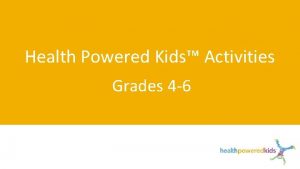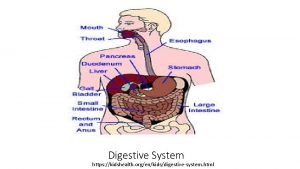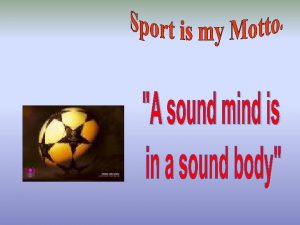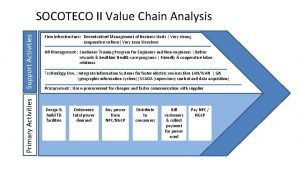Health Powered Kids Activities Grades 4 6 Overview













- Slides: 13

Health Powered Kids™ Activities Grades 4 -6

Overview This slide deck contains tools and modules for working with students in grades 4 -6 online or inperson Contents include: ● ● What We Can Do To Stress Less Gratitude

What We Can Do To Stress Less From Health Powered Kids™ by Allina Health www. healthpoweredkids. org

Notes for Teachers ● ● ● This short lesson is aimed at getting youth to think about their responses to stressful or challenging situations, and to respond positively rather than by adding to the difficulty. Duration: 30 minutes What you need: ○ Internet access to view and listen to “What Pizza Wears Gloves” and “Two Arrows Explainer” videos ○ Pens ○ Multi-colored Post-It® notes ○ Wall space marked off by tape or large sheet of paper Visit: https: //healthpoweredkids. org/lessons/stressless Hand out the Healthy Families Newsletter in English, Spanish, Somali and Hmong so that families can stress less at home.

Learning Objectives ● Young people will learn that everyone can feel stress sometimes, that some stressful feelings are a normal part of life, and that there are things they can do to help reduce and deal with stress.

Activity ● ● ● Show the What Pizza Wears Gloves video and The Two Arrows Explainer video. Talk briefly about what they noticed and what they thought about these two videos. Ask if anyone has any questions about them. Then ask about stress: ○ Do you ever feel stressed out? Have you ever felt like the Pizza or the person who dropped the lunch tray? ○ What does stress feel like in your body and in your thoughts? ○ What causes stress in your life? ○ Do your family members or friends ever get stressed? How can you tell? How do they act? ○ What do you think causes stress for other people?

Activity Continued ● ● ● Talk about how the videos mention “mindfulness” and “Change to Chill. ” Ask youth if they’ve ever heard those terms before and what they think they mean. Talk about their ideas and share your own. Show the youth the pens, sticky notes and wall space. Explain that as a group you are going to write as many ideas as you can about how to stress less or deal with stress when it comes up. Give some examples like, “go for a run, ” “listen to music, ” or “make slime with your friends. ” Give youth a chance to post their own ideas and read through others. Talk briefly about: ○ What’s your favorite way to de-stress? ○ Did you get any new ideas today? ○ What’s one thing you might like to try next time you feel stressed out?

Gratitude: Overlooked Blessings From Health Powered Kids™ by Allina Health www. healthpoweredkids. org

Note to Teachers ● ● This short lesson is aimed at helping young people develop an attitude of gratitude. Research shows that gratitude helps people be happier and deal with stress better. Duration: 20 minutes ● What You Need: ● ○ Computer, speaker and link to Gratitude Meditation recording ○ Flip chart paper and markers ○ Three Good Things Worksheet Link to Lesson ● Additional Instructor Resources ○ Additional information about gratitude: http: //www. changetochill. org/how-can-i/gratitude/ ○ Hand out the Healthy Families Newsletter in English, Spanish, Somali and Hmong so that families can practice gratitude at home.

Learning Targets ● ● Learning targets: An attitude of gratitude isn’t something that people are born with or not; very young children can begin to learn skills and practices that will help them move through life with an appreciative mindset, even when dealing with challenges. This lesson focuses on teaching young children about the concept of gratitude and some ways they can start to incorporate gratitude practices into their lives.

Activity: Gratitude ● ● Talk with the youth about how being grateful for the things in their lives can help increase their happiness and decrease stress. Ask them what they think it means to be grateful. ○ They might say that it means thankful, appreciating what they have, or feeling pleased or content. If no youth offer ideas, prompt them with these ideas or your own. But feeling grateful isn’t always easy and isn’t something that everyone does naturally. It’s pretty easy to compare yourself to those around you and wish you had what they had, or to focus on the challenges and frustrations in your lives. Being grateful is a muscle you can build. Just like you learn or develop a new skill or strength through practice, you can improve your attitude of gratitude by working on it a little bit each day.

Activity: Gratitude ● Ask young people to think about these perspectives: ○ Do you know how many people in the world today have clean drinking water? ■ Give youth a chance to respond. ■ Then talk about that there are more than six million people in the world who don’t have clean water for drinking, cooking, or cleaning themselves. Many people who don’t have these things end up getting sick because of it. ○ How many people do you think have access to a working toilet? ■ More than 1/3 of people living in the world today don’t have access to a working toilet. ■ Talk about what people might do if they don’t have a working toilet. Some of these people have to use a hole in the ground. Others use an outhouse or something similar.

Activity: Gratitude ● ● ● Sometimes we get so used to things that help keep us comfortable, safe and healthy, that we forgot to be grateful for them. These things are overlooked blessings. Together as a class, make a list of overlooked blessings…things that you take for granted but for which, when you stop and think, you are grateful. Post the list somewhere everyone can see it regularly as a reminder. Keep the list up for as long as seems helpful. Consider also sharing the ideas through social media or school or community resources. Do a guided gratitude meditation together: ○ http: //www. changetochill. org/wp-content/uploads/2018/03/Change_to_Chill_Gratitude. mp 3 Distribute the Three Good Things worksheet. Encourage young people to continue to build their “gratitude muscles” by using the worksheet to help remind them of the good things in their lives.
 Health powered kids
Health powered kids Kids r kids west cobb
Kids r kids west cobb Http //kidshealth.org/kid/htbw/digestive system.html
Http //kidshealth.org/kid/htbw/digestive system.html Kids health hygiene
Kids health hygiene Age match
Age match Operating activities vs investing activities
Operating activities vs investing activities Indoor sports outdoor sports
Indoor sports outdoor sports Support activities and primary activities
Support activities and primary activities Tertiary activities definition
Tertiary activities definition Example of nursing process
Example of nursing process Wilson solar powered grill
Wilson solar powered grill Sap business one analytic
Sap business one analytic Solar powered router
Solar powered router Balloon-powered car conclusion
Balloon-powered car conclusion
























